
George Glenn Jones was an American country musician, singer, and songwriter. He achieved international fame for his long list of hit records, including his best-known song "He Stopped Loving Her Today", as well as his distinctive voice and phrasing. For the last two decades of his life, Jones was frequently referred to as the greatest living country singer. Country music scholar Bill Malone writes, "For the two or three minutes consumed by a song, Jones immerses himself so completely in its lyrics, and in the mood it conveys, that the listener can scarcely avoid becoming similarly involved." The shape of his nose and facial features earned Jones the nickname "The Possum". Jones has been called "The Rolls Royce of Country Music" and had more than 160 chart singles to his name from 1955 until his death in 2013.

Jerry Reed Hubbard was an American singer, guitarist, composer, and songwriter as well as an actor who appeared in more than a dozen films. His signature songs included "Guitar Man", "U.S. Male", "A Thing Called Love", "Alabama Wild Man", "Amos Moses", "When You're Hot, You're Hot", "Ko-Ko Joe", "Lord, Mr. Ford", "East Bound and Down", "The Bird", and "She Got the Goldmine ".
"Last Kiss" is a song released by Wayne Cochran in 1961 on the Gala label. It failed to do well on the charts. Cochran subsequently re-recorded his song for the King label in 1963. It was revived by J. Frank Wilson and the Cavaliers, who took it to number two on the Billboard Hot 100 charts. Wednesday, Pearl Jam and several international artists also covered the song, with varying degrees of success. The song was one of several teen tragedy songs from that period. The song's opening lyrics mirror the opening lyrics of Septimus Winner's "Der Deitcher's Dog".
"He Stopped Loving Her Today" is a song recorded by American country music artist George Jones. It has been named in several surveys as the greatest country song of all time. It was released in April 1980 as the lead single from the album I Am What I Am. The song was Jones's first solo No. 1 single in six years. It was written by Bobby Braddock and Curly Putman. The week after Jones' death in 2013, the song re-entered the Hot Country Songs chart at No. 21. As of November 13, 2013, the single has sold 521,000 copies in the United States. Since 2008 it has been preserved by the Library of Congress in the National Recording Registry. The song was ranked no. 142 on Rolling Stone's 2021 500 Greatest Songs of All Time ranking.
"The Wig Master" is the 129th episode of the NBC situation comedy Seinfeld. This is the 19th episode for the seventh season, originally airing on April 4, 1996. The episode follows the mishaps which befall George and Kramer as a result of their parking at a discount parking lot, while Jerry feels emasculated by Elaine's new boyfriend, who holds out the promise of a discount on a designer dress in order to keep her going out with him.
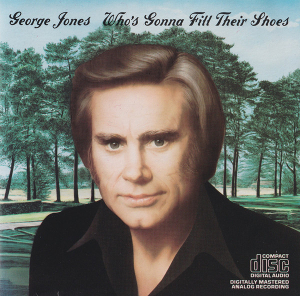
Who's Gonna Fill Their Shoes is the 45th studio album by American country music artist George Jones, released in 1985 on the Epic Records label.
"The Grand Tour" is a song made famous by country music singer George Jones. Originally released in 1974, the song was the title track to his album released that year. The song became Jones' sixth No. 1 song on Billboard's Hot Country Singles chart in August 1974, and was the fourth-biggest hit of the year. In 2014, Rolling Stone named the song number 38 on its "40 Saddest Country Songs of All Time".
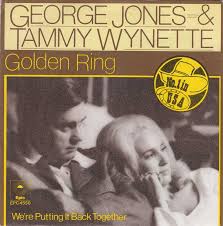
"Golden Ring" is a song written by Bobby Braddock and Rafe Van Hoy, and recorded by American country music singers George Jones and Tammy Wynette. It was released in May 1976 as the first single and title track to their duet album of the same name. It was a number-one hit on the Billboard country chart.

"Brokenheartsville" is a song written by Donny Kees, Blake Mevis, Randy Boudreaux, and Clint Daniels and recorded by American country music singer Joe Nichols. It was released in November 2002 as the second single from Nichols' 2002 album Man with a Memory. The song became Nichols' first number one hit on the U.S. Billboard Hot Country Singles & Tracks chart and earned him his second consecutive Grammy nomination for Best Male Country Vocal Performance. The song also was later covered by Johnny Rodriguez on his 2011 album Live from Texas.

"Riding with Private Malone" is a song written by Wood Newton and Thom Shepherd, and recorded by American country music artist David Ball. It was released in August 2001 as the first single from his album Amigo. The song reached a peak of #2 on the Billboard Hot Country Singles & Tracks charts chart, and #36 on the Billboard Hot 100. It was Ball's first Top 40 country hit since "Look What Followed Me Home" in 1995. USA Today referred to it as "the country song that tapped most subtly and profoundly into the emotions of its audience" after the September 11 attacks, even though it was released to radio a few weeks before the attacks.

"Six Days on the Road" is an American song written by Earl Green and Muscle Shoals Sound Studio songwriter Carl Montgomery, made famous by country music singer Dave Dudley. The song was initially recorded by Paul Davis and released in 1961 on the Bulletin label. In 1963, the song became a major hit when released by Dudley, peaking at #2 on the Billboard Hot Country Songs chart and cracking the Top 40 (#32) on the Hot 100, leading to it being hailed as the definitive celebration of the American truck driver.

"The Impossible" is a song written by Kelley Lovelace and Lee Thomas Miller and recorded by American country music artist Joe Nichols. It was released in March 2002 as the first single from his 2002 album Man with a Memory. The song was Nichols’ first chart entry on the U.S. Billboard Hot Country Singles & Tracks charts, peaking at number 3 in late 2002 and earned Kelly Lovelace and Lee Thomas Miller a Grammy nomination for Best Country Song. Fellow country singer Mark Chesnutt also cut the song around the same time Nichols did but shelved his version, finally releasing it as a bonus track on his compilation album Greatest Hits II.
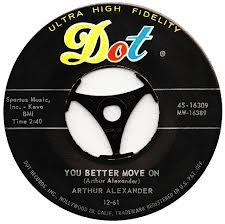
"You Better Move On" is a 1961 rhythm and blues song by Arthur Alexander. It reached number 24 on the Billboard Hot 100 in March 1962. Versions by Billy "Crash" Craddock, George Jones and Johnny Paycheck were hits on the Country charts.

"How Am I Doin'" is a song co-written and recorded by American country music artist Dierks Bentley. It was released in May 2004 as the third and final single from his 2003 self-titled debut album. With a peak at number 4, this song became his second Top 5 hit on the U.S. Billboard Hot Country Songs chart that year. It also reached number 49 on the U.S. Billboard Hot 100. Bentley wrote this song with Writer X, a pseudonym of Jim Beavers.
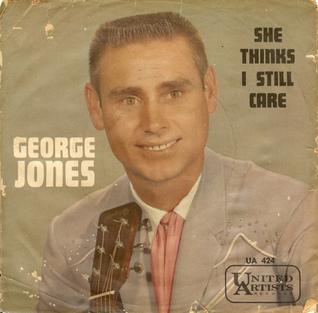
"She Thinks I Still Care" is a country song written by Dickey Lee and Steve Duffy. The song was recorded by multiple artists, including George Jones, Connie Francis, Anne Murray, Elvis Presley and Patty Loveless.
"The Door" is a song written by Billy Sherrill and Norro Wilson, and recorded by American country music artist George Jones. It was released in October 1974 as the first single from the album The Best of George Jones. "The Door" was George Jones' sixth number one on the country chart as a solo artist. The single stayed a single week at number one and would spend a total of ten weeks on the country chart.
"I Always Get Lucky With You" is a song written by Merle Haggard, Freddy Powers, Gary Church, and Tex Whitson. It was first recorded by Haggard on his 1981 album Big City and then covered by American country music artist George Jones in April 1983 as the second single from the album Shine On. The song was Jones' ninth and final number one on the country chart as a solo artist. The single stayed at number one for one week and spent thirteen weeks on the country chart.
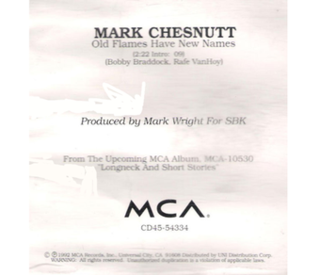
"Old Flames Have New Names" is a song written by Bobby Braddock and Rafe Van Hoy, and recorded by American country music singer Mark Chesnutt. It was released in February 1992 and is one of his most well known songs. It was the leading single from Chesnutt's second album Longnecks & Short Stories.

"The King Is Gone ", originally titled "Ya Ba Da Ba Do ", is a song written by Roger D. Ferris, and recorded by American country music singer George Jones. It was released in April 1989 as the second single from the album One Woman Man.












